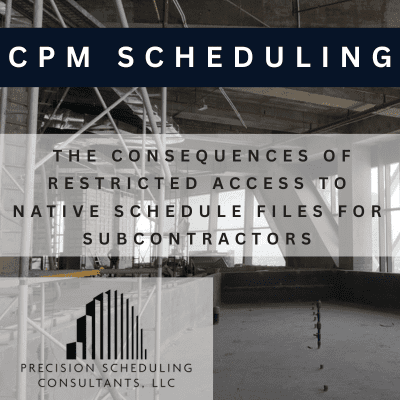Effective communication and transparency are essential for each shareholder’s project success. Unfortunately, a trend has emerged where prime contractors restrict access to native schedule files, such as .xer and .mpp formats, substantially impacting subcontractors’ capabilities. This practice constrains the information available to these crucial project participants and hinders their ability to manage their timelines and resources effectively.
Understanding the Importance of Native Schedule Files
Native schedule files contain vital data regarding project timelines, resource allocations, and progress tracking. They provide a detailed view of how a project is progressing and what adjustments may be required. When subcontractors have access to these native documents, they can align their work with the project’s overall timeline. Unfortunately, limited access to these files creates a disconnect between the prime contractor and subcontractors.
The Impacts of Prime Contractors Restricting Access to Subcontractors
By restricting access to native schedule files, prime contractors create several significant challenges for subcontractors. First, subcontractors face difficulties tracking their progress against project milestones. Without accurate data, they cannot evaluate their performance regarding the project schedule. This lack of data can lead to delays in completing tasks and increase costs.
Second, the inability to view native schedule files limits subcontractors’ understanding of how their work impacts the overall project. Without the complete picture, subcontractors may make decisions that inadvertently conflict with the project’s objectives. This disconnect often leads to confusion, inefficiencies, and potential conflicts.
Hurdles in Claim Management
One of the most detrimental effects of restricted access involves the claims process. When subcontractors encounter delays or changes, they must document these issues thoroughly. Comprehensive documentation is critical for justifying claims. However, without access to native schedule files, subcontractors struggle to gather the necessary evidence to support their claims.
This limitation prolongs the claims process and may result in denials or reduced settlements. Effective claim management is crucial for maintaining profitability and cash flow in today’s advanced construction environment. As a result, prime contractors should consider how their practices affect subcontractors’ abilities to track and manage claims effectively.
A Disconnect in Communication
Effective communication between prime contractors and subcontractors can mitigate many of the issues arising from restricted access. However, when prime contractors withhold critical information, they inadvertently widen the gap between the parties. Subcontractors often find themselves guessing about project timelines and expectations.
Moreover, withholding access can foster a culture of mistrust. Subcontractors may feel undervalued or excluded from important project decisions. This sentiment can lead to decreased morale and productivity on-site. Positive relationships are essential for successful collaboration; clear communication is foundational to building those relationships.
Promoting Transparency and Collaboration
Prime contractors should adopt a more transparent approach to counteract the issues arising from restricted access to native schedule files. Sharing schedule information openly with subcontractors can facilitate better collaboration and improved project outcomes.
For instance, utilizing cloud-based project management tools can provide real-time access to schedules and other crucial documents. This approach enhances visibility and allows for timely updates and changes. Prime contractors empower subcontractors to align their work with project goals by simplifying access to key information.
Sharing Native Schedule Files
The construction industry thrives on collaboration and effective communication. By restricting access to native schedule files, prime contractors hamper subcontractors’ ability to function efficiently and their ability to track project impacts. This practice creates barriers to progress tracking, complicates claims management, and harms relationships between project participants.
Ultimately, fostering a collaborative environment ensures that all parties can contribute effectively. By providing access to the native schedule files, prime contractors enhance the overall project experience and set the stage for successful project delivery. Embracing transparency and open communication can significantly mitigate the adverse impacts of insufficient access, leading to more successful outcomes for all involved. In the end, prioritizing collaboration benefits subcontractors, prime contractors, and owners alike, resulting in a smoother, more efficient construction process.


